- Home
- Jack London
John Barleycorn Page 13
John Barleycorn Read online
Page 13
The worst of it was that I was actually typing my manuscripts at the same time I was trying to master that machine. It was a feat of physical endurance and a brain storm combined to type a thousand words, and I was composing thousands of words every day which just had to be typed for the waiting editors.
Oh, between the writing and the typewriting I was well a-weary. I had brain and nerve fag, and body fag as well, and yet the thought of drink never suggested itself. I was living too high to stand in need of an anodyne. All my waking hours, except those with that infernal typewriter, were spent in a creative heaven. And along with this I had no desire for drink because I still believed in many thingsin the love of all men and women in the matter of man and woman love; in fatherhood; in human justice; in artin the whole host of fond illusions that keep the world turning around.
But the waiting editors elected to keep on waiting. My manuscripts made amazing round-trip records between the Pacific and the Atlantic . It might have been the weirdness of the typewriting that prevented the editors from accepting at least one little offering of mine. I don’t know, and goodness knows the stuff I wrote was as weird as its typing. I sold my hard-bought school books for ridiculous sums to second-hand bookmen. I borrowed small sums of money wherever I could, and suffered my old father to feed me with the meagre returns of his failing strength.
It didn’t last long, only a few weeks, when I had to surrender and go to work. Yet I was unaware of any need for the drink anodyne. I was not disappointed. My career was retarded, that was all. Perhaps I did need further preparation. I had learned enough from the books to realise that I had only touched the hem of knowledge’s garment. I still lived on the heights. My waking hours, and most of the hours I should have used for sleep, were spent with the books.
CHAPTER XXIV
Out in the country, at the Belmont Academy , I went to work in a small, perfectly appointed steam laundry. Another fellow and myself did all the work from sorting and washing to ironing the white shirts, collars and cuffs, and the “fancy starch” of the wives of the professors. We worked like tigers, especially as summer came on and the academy boys took to the wearing of duck trousers. It consumes a dreadful lot of time to iron one pair of duck trousers. And there were so many pairs of them. We sweated our way through long sizzling weeks at a task that was never done; and many a night, while the students snored in bed, my partner and I toiled on under the electric light at steam mangle or ironing board.
The hours were long, the work was arduous, despite the fact that we became past masters in the art of eliminating waste motion. And I was receiving thirty dollars a month and boarda slight increase over my coal-shovelling and cannery days, at least to the extent of board, which cost my employer little (we ate in the kitchen), but which was to me the equivalent of twenty dollars a month. My robuster strength of added years, my increased skill, and all I had learned from the books, were responsible for this increase of twenty dollars. Judging by my rate of development, I might hope before I died to be a night watchman for sixty dollars a month, or a policeman actually receiving a hundred dollars with pickings.
So relentlessly did my partner and I spring into our work throughout the week that by Saturday night we were frazzled wrecks. I found myself in the old familiar work-beast condition, toiling longer hours than the horses toiled, thinking scarcely more frequent thoughts than horses think. The books were closed to me. I had brought a trunkful to the laundry, but found myself unable to read them. I fell asleep the moment I tried to read; and if I did manage to keep my eyes open for several pages, I could not remember the contents of those pages. I gave over attempts on heavy study, such as jurisprudence, political economy, and biology, and tried lighter stuff, such as history. I fell asleep. I tried literature, and fell asleep. And finally, when I fell asleep over lively novels, I gave up. I never succeeded in reading one book in all the time I spent in the laundry.
And when Saturday night came, and the week’s work was over until Monday morning, I knew only one desire besides the desire to sleep, and that was to get drunk. This was the second time in my life that I had heard the unmistakable call of John Barleycorn. The first time it had been because of brain-fag. But I had no overworked brain now. On the contrary, all I knew was the dull numbness of a brain that was not worked at all. That was the trouble. My brain had become so alert and eager, so quickened by the wonder of the new world the books had discovered to it, that it now suffered all the misery of stagnancy and inaction.
And I, the long time intimate of John Barleycorn, knew just what he promised memaggots of fancy, dreams of power, forgetfulness, anything and everything save whirling washers, revolving mangles, humming centrifugal wringers, and fancy starch and interminable processions of duck trousers moving in steam under my flying iron. And that’s it. John Barleycorn makes his appeal to weakness and failure, to weariness and exhaustion. He is the easy way out. And he is lying all the time. He offers false strength to the body, false elevation to the spirit, making things seem what they are not and vastly fairer than what they are.
But it must not be forgotten that John Barleycorn is protean. As well as to weakness and exhaustion, does he appeal to too much strength, to superabundant vitality, to the ennui of idleness. He can tuck in his arm the arm of any man in any mood. He can throw the net of his lure over all men. He exchanges new lamps for old, the spangles of illusion for the drabs of reality, and in the end cheats all who traffic with him.
I didn’t get drunk, however, for the simple reason that it was a mile and a half to the nearest saloon. And this, in turn, was because the call to get drunk was not very loud in my ears. Had it been loud, I would have travelled ten times the distance to win to the saloon. On the other hand, had the saloon been just around the corner, I should have got drunk. As it was, I would sprawl out in the shade on my one day of rest and dally with the Sunday papers. But I was too weary even for their froth. The comic supplement might bring a pallid smile to my face, and then I would fall asleep.
Although I did not yield to John Barleycorn while working in the laundry, a certain definite result was produced. I had heard the call, felt the gnaw of desire, yearned for the anodyne. I was being prepared for the stronger desire of later years.
And the point is that this development of desire was entirely in my brain. My body did not cry out for alcohol. As always, alcohol was repulsive to my body. When I was bodily weary from shovelling coal the thought of taking a drink had never flickered into my consciousness. When I was brain-wearied after taking the entrance examinations to the university, I promptly got drunk. At the laundry I was suffering physical exhaustion again, and physical exhaustion that was not nearly so profound as that of the coal-shovelling. But there was a difference. When I went coal-shovelling my mind had not yet awakened. Between that time and the laundry my mind had found the kingdom of the mind. While shovelling coal my mind was somnolent. While toiling in the laundry my mind, informed and eager to do and be, was crucified.
And whether I yielded to drink, as at Benicia , or whether I refrained, as at the laundry, in my brain the seeds of desire for alcohol were germinating.
CHAPTER XXV
After the laundry my sister and her husband grubstaked me into the Klondike . It was the first gold rush into that region, the early fall rush of 1897. I was twenty-one years old, and in splendid physical condition. I remember, at the end of the twenty-eight-mile portage across Chilcoot from Dyea Beach to Lake Linderman , I was packing up with the Indians and out-packing many an Indian. The last pack into Linderman was three miles. I back-tripped it four times a day, and on each forward trip carried one hundred and fifty pounds. This means that over the worst trails I daily travelled twenty-four miles, twelve of which were under a burden of one hundred and fifty pounds.
Yes, I had let career go hang, and was on the adventure-path again in quest of fortune. And of course, on the adventure-path, I met John Barleycorn. Here were the chesty men again, rovers and adventurers, and while they did
n’t mind a grub famine, whisky they could not do without. Whisky went over the trail, while the flour lay cached and untouched by the trail-side.
As good fortune would have it, the three men in my party were not drinkers. Therefore I didn’t drink save on rare occasions and disgracefully when with other men. In my personal medicine chest was a quart of whisky. I never drew the cork till six months afterward, in a lonely camp, where, without anaesthetics, a doctor was compelled to operate on a man. The doctor and the patient emptied my bottle between them and then proceeded to the operation.
Back in California a year later, recovering from scurvy, I found that my father was dead and that I was the head and the sole bread-winner of a household. When I state that I had passed coal on a steamship from Behring Sea to British Columbia , and travelled in the steerage from there to San Francisco , it will be understood that I brought nothing back from the Klondike but my scurvy.
Times were hard. Work of any sort was difficult to get. And work of any sort was what I had to take, for I was still an unskilled labourer. I had no thought of career. That was over and done with. I had to find food for two mouths beside my own and keep a roof over our headsyes, and buy a winter suit, my one suit being decidedly summery. I had to get some sort of work immediately. After that, when I had caught my breath, I might think about my future.
Unskilled labour is the first to feel the slackness of hard times, and I had no trades save those of sailor and laundryman. With my new responsibilities I didn’t dare go to sea, and I failed to find a job at laundrying. I failed to find a job at anything. I had my name down in five employment bureaux. I advertised in three newspapers. I sought out the few friends I knew who might be able to get me work; but they were either uninterested or unable to find anything for me.
The situation was desperate. I pawned my watch, my bicycle, and a mackintosh of which my father had been very proud and which he had left to me. It was and is my sole legacy in this world. It had cost fifteen dollars, and the pawnbroker let me have two dollars on it. Andoh, yesa water-front comrade of earlier years drifted along one day with a dress suit wrapped in newspapers. He could give no adequate explanation of how he had come to possess it, nor did I press for an explanation. I wanted the suit myself. No; not to wear. I traded him a lot of rubbish which, being unpawnable, was useless to me. He peddled the rubbish for several dollars, while I pledged the dress-suit with my pawnbroker for five dollars. And for all I know the pawnbroker still has the suit. I had never intended to redeem it.
But I couldn’t get any work. Yet I was a bargain in the labour market. I was twenty-two years old, weighed one hundred and sixty-five pounds stripped, every pound of which was excellent for toil; and the last traces of my scurvy were vanishing before a treatment of potatoes chewed raw. I tackled every opening for employment. I tried to become a studio model, but there were too many fine-bodied young fellows out of jobs. I answered advertisements of elderly invalids in need of companions. And I almost became a sewing machine agent, on commission, without salary. But poor people don’t buy sewing machines in hard times, so I was forced to forgo that employment.
Of course, it must be remembered that along with such frivolous occupations I was trying to get work as wop, lumper, and roustabout. But winter was coming on, and the surplus labour army was pouring into the cities. Also I, who had romped along carelessly through the countries of the world and the kingdom of the mind, was not a member of any union.
I sought odd jobs. I worked days, and half-days, at anything I could get. I mowed lawns, trimmed hedges, took up carpets, beat them, and laid them again. Further, I took the civil service examinations for mail carrier and passed first. But alas! there was no vacancy, and I must wait. And while I waited, and in between the odd jobs I managed to procure, I started to earn ten dollars by writing a newspaper account of a voyage I had made, in an open boat down the Yukon , of nineteen hundred miles in nineteen days. I didn’t know the first thing about the newspaper game, but I was confident I’d get ten dollars for my article.
But I didn’t. The first San Francisco newspaper to which I mailed it never acknowledged receipt of the manuscript, but held on to it. The longer it held on to it the more certain I was that the thing was accepted.
And here is the funny thing. Some are born to fortune, and some have fortune thrust upon them. But in my case I was clubbed into fortune, and bitter necessity wielded the club. I had long since abandoned all thought of writing as a career. My honest intention in writing that article was to earn ten dollars. And that was the limit of my intention. It would help to tide me along until I got steady employment. Had a vacancy occurred in the post office at that time, I should have jumped at it.
But the vacancy did not occur, nor did a steady job; and I employed the time between odd jobs with writing a twenty-one-thousand-word serial for the “Youth’s Companion.” I turned it out and typed it in seven days. I fancy that was what was the matter with it, for it came back.
It took some time for it to go and come, and in the meantime I tried my hand at short stories. I sold one to the “Overland Monthly” for five dollars. The “Black Cat” gave me forty dollars for another. The “Overland Monthly” offered me seven dollars and a half, pay on publication, for all the stories I should deliver. I got my bicycle, my watch, and my father’s mackintosh out of pawn and rented a typewriter. Also, I paid up the bills I owed to the several groceries that allowed me a small credit. I recall the Portuguese groceryman who never permitted my bill to go beyond four dollars. Hopkins, another grocer, could not be budged beyond five dollars.
And just then came the call from the post office to go to work. It placed me in a most trying predicament. The sixty-five dollars I could earn regularly every month was a terrible temptation. I couldn’t decide what to do. And I’ll never be able to forgive the postmaster of Oakland . I answered the call, and I talked to him like a man. I frankly told him the situation. It looked as if I might win out at writing. The chance was good, but not certain. Now, if he would pass me by and select the next man on the eligible list and give me a call at the next vacancy
But he shut me off with: “Then you don’t want the position?”
“But I do,” I protested. “Don’t you see, if you will pass me over this time”
“If you want it you will take it,” he said coldly.
Happily for me, the cursed brutality of the man made me angry.
“Very well,” I said. “I won’t take it.”
CHAPTER XXVI
Having burned my ship, I plunged into writing. I am afraid I always was an extremist. Early and late I was at itwriting, typing, studying grammar, studying writing and all the forms of writing, and studying the writers who succeeded in order to find out how they succeeded. I managed on five hours’ sleep in the twenty-four, and came pretty close to working the nineteen waking hours left to me. My light burned till two and three in the morning, which led a good neighbour woman into a bit of sentimental Sherlock-Holmes deduction. Never seeing me in the day-time, she concluded that I was a gambler, and that the light in my window was placed there by my mother to guide her erring son home.
The trouble with the beginner at the writing game is the long, dry spells, when there is never an editor’s cheque and everything pawnable is pawned. I wore my summer suit pretty well through that winter, and the following summer experienced the longest, dryest spell of all, in the period when salaried men are gone on vacation and manuscripts lie in editorial offices until vacation is over.
My difficulty was that I had no one to advise me. I didn’t know a soul who had written or who had ever tried to write. I didn’t even know one reporter. Also, to succeed at the writing game, I found I had to unlearn about everything the teachers and professors of literature of the high school and university had taught me. I was very indignant about this at the time; though now I can understand it. They did not know the trick of successful writing in the years 1895 and 1896. They knew all about “Snow Bound” and “Sartor Resa
rtus”; but the American editors of 1899 did not want such truck. They wanted the 1899 truck, and offered to pay so well for it that the teachers and professors of literature would have quit their jobs could they have supplied it.
I struggled along, stood off the butcher and the grocer, pawned my watch and bicycle and my father’s mackintosh, and I worked. I really did work, and went on short commons of sleep. Critics have complained about the swift education one of my characters, Martin Eden, achieved. In three years, from a sailor with a common school education, I made a successful writer of him. The critics say this is impossible. Yet I was Martin Eden. At the end of three working years, two of which were spent in high school and the university and one spent at writing, and all three in studying immensely and intensely, I was publishing stories in magazines such as the “Atlantic Monthly,” was correcting proofs of my first book (issued by Houghton, Mifflin Co.), was selling sociological articles to “Cosmopolitan” and “McClure’s,” had declined an associate editorship proffered me by telegraph from New York City, and was getting ready to marry.
Now the foregoing means work, especially the last year of it, when I was learning my trade as a writer. And in that year, running short on sleep and tasking my brain to its limit, I neither drank nor cared to drink. So far as I was concerned, alcohol did not exist. I did suffer from brain-fag on occasion, but alcohol never suggested itself as an ameliorative. Heavens! Editorial acceptances and cheques were all the amelioratives I needed. A thin envelope from an editor in the morning’s mail was more stimulating than half a dozen cocktails. And if a cheque of decent amount came out of the envelope, such incident in itself was a whole drunk.

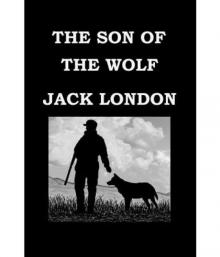 The Son of the Wolf
The Son of the Wolf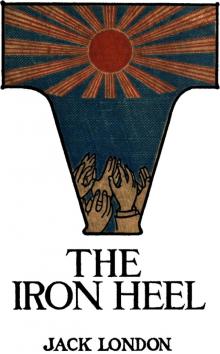 The Iron Heel
The Iron Heel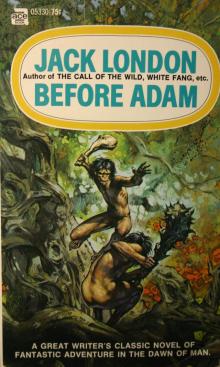 Before Adam
Before Adam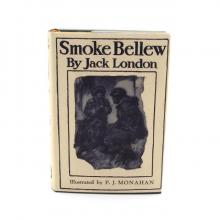 Smoke Bellew
Smoke Bellew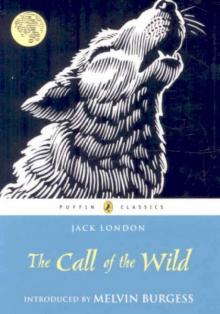 The Call of the Wild
The Call of the Wild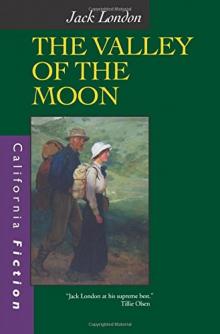 The Valley of the Moon Jack London
The Valley of the Moon Jack London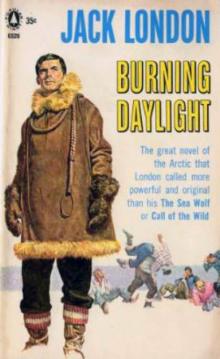 Burning Daylight
Burning Daylight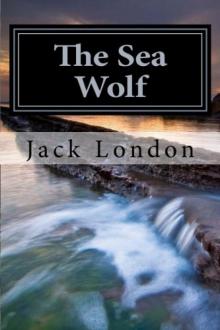 The Sea Wolf
The Sea Wolf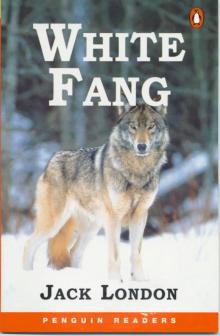 White Fang
White Fang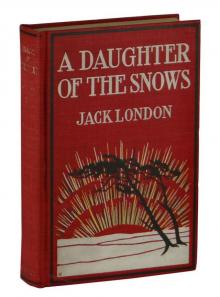 A Daughter of the Snows
A Daughter of the Snows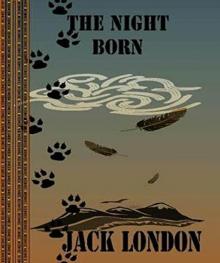 The Night-Born
The Night-Born A Son Of The Sun
A Son Of The Sun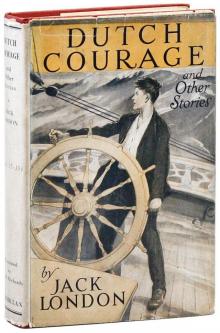 Dutch Courage and Other Stories
Dutch Courage and Other Stories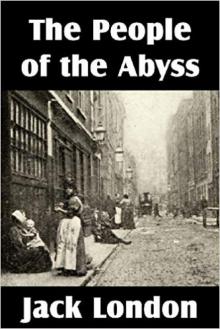 The People of the Abyss
The People of the Abyss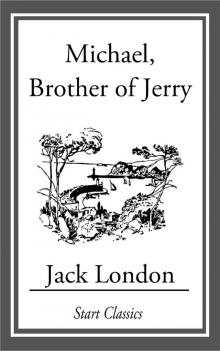 Michael, Brother of Jerry
Michael, Brother of Jerry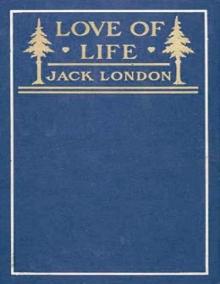 Love of Life, and Other Stories
Love of Life, and Other Stories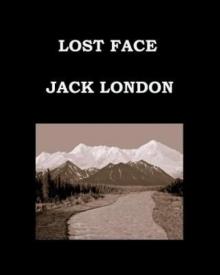 Lost Face
Lost Face The Road
The Road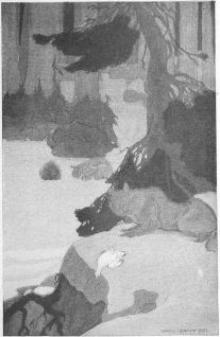 Love of Life
Love of Life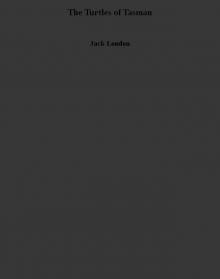 The Turtles of Tasman
The Turtles of Tasman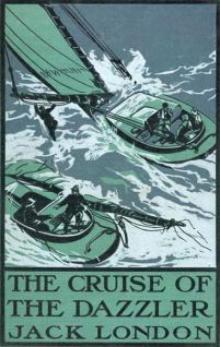 The Cruise of The Dazzler
The Cruise of The Dazzler The Heathen
The Heathen The Scab
The Scab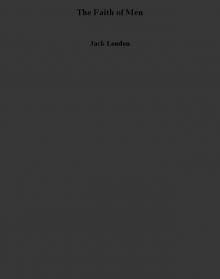 The Faith of Men
The Faith of Men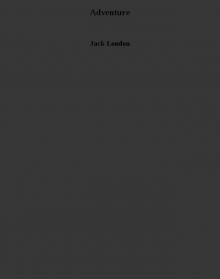 Adventure
Adventure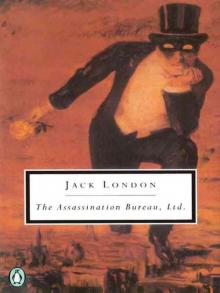 The Assassination Bureau, Ltd.
The Assassination Bureau, Ltd.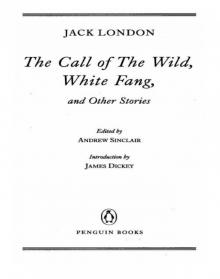 The Call of the Wild, White Fang, and Other Stories
The Call of the Wild, White Fang, and Other Stories The Call of the Wild and Selected Stories
The Call of the Wild and Selected Stories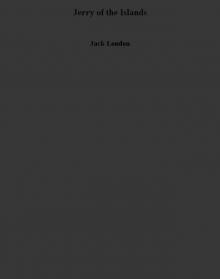 Jerry of the Islands
Jerry of the Islands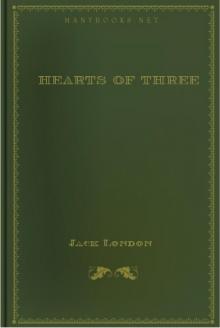 Hearts of Three
Hearts of Three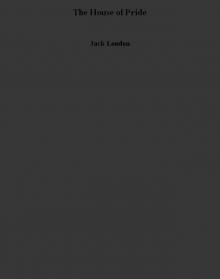 The House of Pride
The House of Pride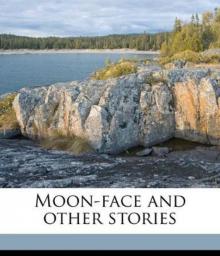 Moon-Face and Other Stories
Moon-Face and Other Stories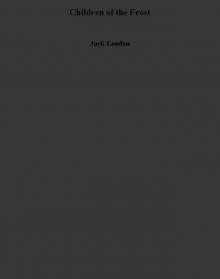 Children of the Frost
Children of the Frost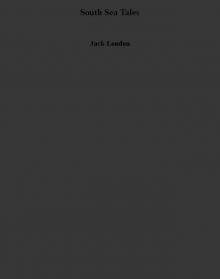 South Sea Tales
South Sea Tales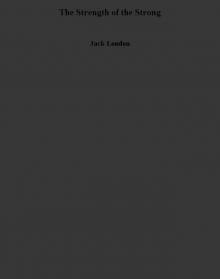 The Strength of the Strong
The Strength of the Strong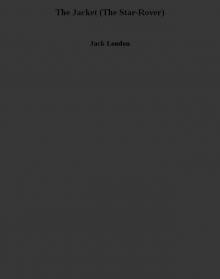 The Jacket (The Star-Rover)
The Jacket (The Star-Rover)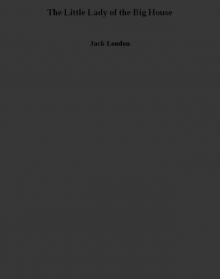 The Little Lady of the Big House
The Little Lady of the Big House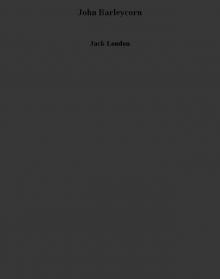 John Barleycorn
John Barleycorn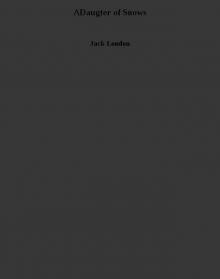 ADaugter of Snows
ADaugter of Snows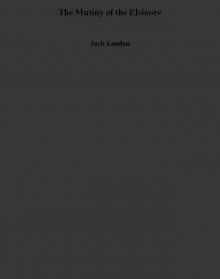 The Mutiny of the Elsinore
The Mutiny of the Elsinore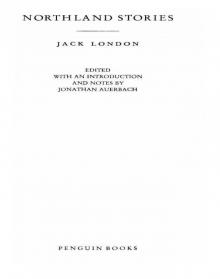 Northland Stories
Northland Stories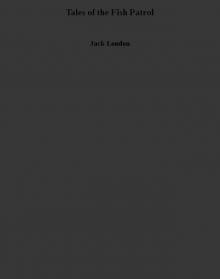 Tales of the Fish Patrol
Tales of the Fish Patrol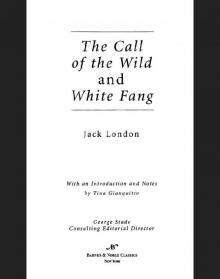 Call of the Wild and White Fang (Barnes & Noble Classics Series)
Call of the Wild and White Fang (Barnes & Noble Classics Series)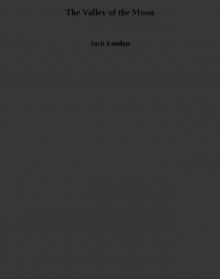 The Valley of the Moon
The Valley of the Moon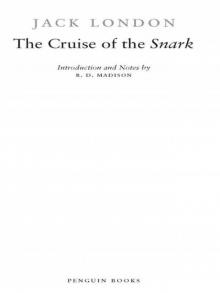 The Cruise of the Snark
The Cruise of the Snark The Game
The Game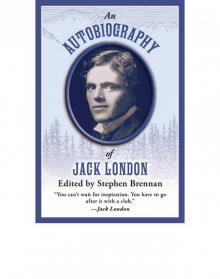 An Autobiography of Jack London
An Autobiography of Jack London